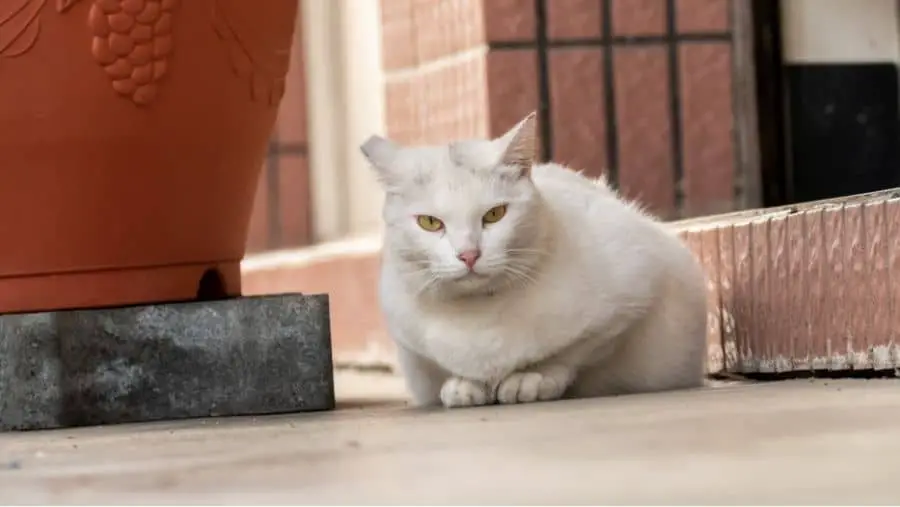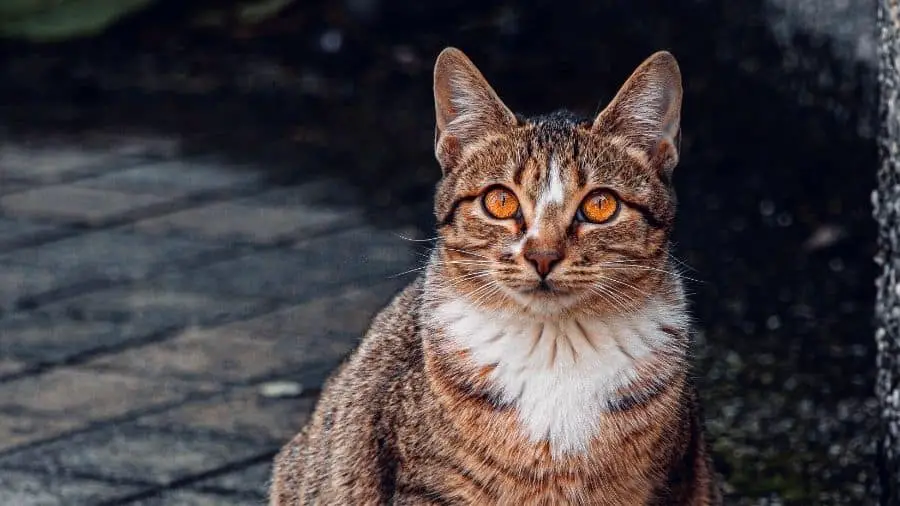More Meows is an Amazon Associate. As an Amazon Associate we earn from qualifying purchases. We may also earn commissions if you purchase products from other retailers after clicking on a link from our site.
One of the most concerning aspects of witnessing an innocent cat roaming outdoors is that they may not have eaten all day. Hunger is understandable distress for animal lovers and community caregivers. But do stray cats die of hunger?
Sometimes stray cats die of hunger. While stray cats may become efficient in finding useful food sources outdoors, those who cannot access food or adapt outdoors may suffer from starvation. These cats will, unfortunately, have a lower chance of survival.
Cats are infamous for their exceptional survival skills, as they are naturally adept, agile, instinctive hunters, and are incredibly resourceful. However, how useful these skills are is influenced by the environment’s resources, and outdoor cats often do not have the freedom to access the amount of food they need. Stick around to find out about stray cats and their nourishment sources outdoors, as well as why some survive while others do not.

Do Stray Cats Die of Hunger?
As with any animal or living organism that needs a certain level of sustenance to survive, cats have their nourishment needs regardless of their domestication level. However, strays are far more susceptible to passing on from such causes due to limited access to food and nourishment sources, which will indeed provide their bodies with what it needs.
Over 60 million homeless cats are wandering America’s streets, commonly targeting backyards, garages, parks, alleys, and lots. All of these cats are struggling to find their way in the world. Homeless cats have very little to choose from in terms of their nourishment and well-being. Sadly, many strays die from various reasons, including exposure, violence, attacks, accidents, multiple diseases, and starvation.
How Do Stray Cats Stay Alive?
Survival of the fittest plays the most considerable role in who survives and who does not. The complexity of a stray living outdoors and trying to stay sustained is mainly because of care from birth, which can be understood in depth when comparing a domestic cat and feral cat’s upbringing, specifically about their feeding patterns and innate tendencies.
Domestic Cats Feeding Behavior
Its mother should have fed a domestic cat until four weeks. Then care would likely transition to a human. Their human would have provided various food and water sources for the cat at differing stages of its life, which would have created a balance between the need for being fed by their caregiver – first their mother, and then their human.
Another cat behavior that people wonder about for stray cats is whether stray cats clean themselves. To learn more about if stray cats clean themselves, check out my article: Click Here.
How Feral Cats Eat
Feral cats would have been fed by their feral mothers outdoors as the feral mother hunted and scavenged for food. At around four weeks, the mother would begin to allow the kittens to become independent. There would be little to no assistance from humans, meaning the cats would continue meeting their own nourishment needs into adulthood, improving and practicing hunting and scavenging skills.
This means that feral cats would be exceptional at hunting and scavenging for food once they reach adulthood, topped with knowledge of the best resources in the area and the advantage of pack hunting or roaming in colonies. If these two scenarios are compared to the situation a stray would find themselves in, it’s easy to see why strays would be more vulnerable to dying of hunger.
Stray Cats Are Stuck in The Middle
Stray cats are found somewhere in the middle ground between domestic and feral, as they would have had a partial upbringing of a domestic cat and would now be ‘expected’ to adapt to the feeding patterns of a feral cat.
For some cats, this will simply not be a practical adaptation, and they will slowly lose more and more nutrition until they will no longer survive. For others, they may adapt and learn how to learn these natural wildlife skills on their own.
Additionally, the cat’s breed will play a role, as some breeds are naturally inclined to hunt compared to others who are timid in temperament.
Cat breeds who have these inclinations will be more likely to adapt to such behavior outdoors, as a stray can become feral over time. But, it’s essential to understand that cats do not only return to their wild instincts when outdoors and will not just be able to start fending for themselves.
One instinct stray cats may have is burying their poop. To learn the smelly details about if stray cats bury their poop, read my article on the subject: Click Here.
Will a Stray Cat Starve if I Stop Feeding it?
While strays can find food outdoors, this is incredibly challenging and often dangerous for them. Strays and feral cats feed based on opportunity, and they have adapted to feeding on the waste of humans for the easiest source of food. Although many meals result from hunting skills, strays and feral cats prefer to feed on scavenging garbage bins and other areas that could contain food waste.
Stray Cat Needs
A study conducted in Brooklyn determined that cats living outdoors are far more dependent on human food waste and local garbage. The study estimated that outdoor cats could be fed around three times a day with the local food waste alone within that area. This was in addition to kind caregivers and opportunistic prey as food sources.
So, next time you’re wondering if the small meal you’re offering is making a difference in a stray cat’s life, remember that its favored meal may come from your trash can. Community caregivers who set up communal feeding areas for strays and individuals who have contributed to doorstep colony care have made a world of difference in these animals’ lives.
However, overpopulating should be considered, and feeding strays should always be paired with Trap-Neuter-Return (TNR) or Trap-Neuter-Return-Monitor (TNRM) programs.
If you wonder if the stray cat you know can be affectionate, check out my article on the subject: Click Here.
How Long Can a Stray Cat Survive Without Food?
How long a stray cat would survive without food would depend on several factors, including whether they have free access to water during that time. If they do have water, cats may survive for up to 14 days without food, but they typically live for 3 – 4 days without food since they need protein for survival.

How long can stray cats live without water?
Strays mostly drink from puddles, water fountains, and even birdbaths, and cats cannot go very long without water. Similar to humans, they can survive longer with water and no food compared to food and no water. They can typically survive for a maximum of 3 days without water before becoming severely dehydrated and passing on.
Some stray cats that have a hard time finding clean water have been known to even drink antifreeze. To learn more about this phenomenon, check out my article if stray cats will drink antifreeze: Click Here.
Do Stray Cats Starve?
Stray cats are good at finding food on their own, but they can starve. The adverse effects of being under-fed usually begin to set in after the stray cat has not eaten for around two days. Various signs of malnourishment can start to set in, in addition to some indications of sickness – some of which may need urgent medical care to resolve as opposed to merely feeding the cat back to proper health.
How Do Stray Cats Find Food?
Depending on a combination of factors such as the cat’s breed, physical ability, cognitive ability, and capacity for adapting to the environment, they may be able to find food effectively. Stray cats will hunt and scavenge.
Some cats are also more adept at reaching heights, jumping, or climbing than others, which may have shorter limbs or heftier frames, for example. This would also affect how easily garbage cans and other areas can be scavenged for food.
Their knowledge of human behavior may give them insight into where they may find human food waste in various areas, and they may be able to adapt in this way. But, some strays are simply unable to stay nourished and sustained without their human feeding them traditionally.
Some people like to feed stray cats. Learn more about if stray cats get attached to one person in my article on the subject: Click Here.
It is much more challenging for some cats to alter this aspect of their lifestyle, and they may never learn how to find food outdoors.
Do Stray Cats Hunt?
Of course, there will always be some days where food is almost impossible to scavenge. In such scenarios, outdoor cats will naturally turn to their hunting instincts as a last resort. They are exceptional at lying in wait for prey, stalking, and pouncing when the time is just right. Thus, stray cats prefer to hunt rodents and occasionally bugs.
Strays consume birds when there is an opportunity for it, and they do not actively hunt them commonly. Again, this is not the standard – some cats simply cannot adopt the necessary hunting skills or may have become accustomed to domesticated feeding patterns resulting in no drive to find food on their own.
Although the potential aloofness of a stray may indicate a need for space, outdoor cats will benefit from humans’ supportive assistance, which does not always necessitate direct intervention. As skilled as they are, they are limited to what is available in the environment, and they would not say no to a fresh meal. Contact your local authorities to find out how you could help prevent local strays from dying of starvation safely and constructively.
To learn more about cats’ hunting ability, check out my article on if cats like to hunt: Click Here.
Conclusion
Stray cats are excellent scavengers from what humans leave behind, and they are also skilled hunters. However, sometimes food becomes scarce, and stray cats can starve and die of hunger. If you are currently feeding a stray cat, you may want to consider the effects of you feeding a stray. You may also want to consider what happens if you stop feeding the stray cat and the implications of stray cat overpopulation.
If you enjoyed this article, please check out a couple of other articles:
- Do Stray Cats Carry Diseases? You Need To Read This: Click Here.
- Do Stray Cats Carry Rabies? The Most Revealing Info: Click Here.
